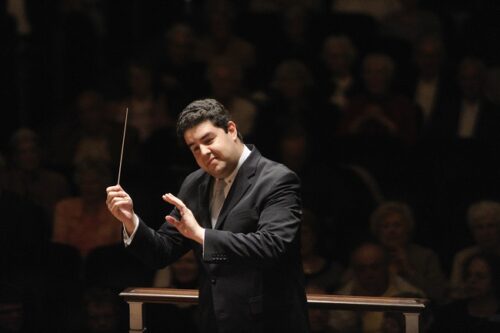 United Kingdom Bartók, Anna Clyne, Chopin: Eric Lu (pianist), BBC Scottish Symphony Orchestra / Tito Muñoz (conductor), City Halls, Glasgow, 27.10.2022 (GT)
United Kingdom Bartók, Anna Clyne, Chopin: Eric Lu (pianist), BBC Scottish Symphony Orchestra / Tito Muñoz (conductor), City Halls, Glasgow, 27.10.2022 (GT)

Anna Clyne – This Midnight Hour
Chopin – Piano Concerto in E minor, Op.11
Bartók – Concerto for Orchestra, Sz.116
The American composer Anna Clyne’s music has become a regular feature in Scotland’s musical scene as she has been Associate Composer with the Scottish Chamber Orchestra, however she has still to find her own expression with different influences characterising her finely crafted music. This Midnight Hour dates from 2015 and was written for the Orchestre national d’Île-de-France when she was the resident composer.
In this piece, Clyne takes as her inspiration Baudelaire’s ‘Harmonie du soir’ in which she uses the four stanzas to evoke an evening spent in erotic anticipation. There is also a single stanza from the twentieth-century Spanish poet Juan Ramón Jiménez about ‘a woman running nakedly mad through the pure night’ in which the composer attempts to evoke a visual journey’. The opening bars were attractive and finely played on the strings with a honeyed toned harmony in the woodwind leading to an exotically fashioned orchestral picture. The music was well orchestrated with fine writing for those woodwind and strings, yet while it is alluring, it doesn’t last in one’s memory for too long. Before the close, there emerged a melancholy waltz in which the violas evoked the sound of a street accordion, and as a coup de théâtre, the two trumpets of Hedley Benson and Mark Calder made their way offstage to the rear gallery to bring The Midnight Hour to a thrilling close. Certainly, this almost cinematic piece is worth hearing again, and hopefully we will be hearing more of Clyne’s music here in Scotland.
The 2018 Leeds Piano Competition winner Eric Lu only arrived here the day before this concert as the originally booked Russian pianist Zlata Chochieva cancelled her engagement owing to the current problems travelling from Russia. This was in addition to the conductor Joanna Carneiro cancelling at late notice. That this concert was able to still present top-class performers is remarkable.
The American conductor Tito Muñoz had already shown his skills in the opening piece, and he has a dynamic, energetic style bringing out all the intricacy of the composer’s ideas. In the Chopin concerto, he drew out all the beauty of the extended orchestral introduction with fine playing especially from the strings. Eric Lu provided wonderfully assured keyboard playing evincing all the poetry of the score. The orchestra were a bit listless in their accompaniment and perhaps highlighted the weak orchestration of the work. In the Larghetto, the strings were too relaxed, yet the American pianist offered beautifully intimate playing and wonderful intonation. In the Rondo finale, contrasting with the rather surly chords from the low strings, the bright colourful harmonies from Lu were characterised by rhapsodically flowing notes helping deliver an effervescent and joyful climax.
In his pre-concert interview, the American conductor talked about the ‘mysterious sounds’ of Bartók’s final masterpiece and commented that the composer was perhaps ‘depressed from the wars’ and that ‘night music is something personal to him’ and that he was still ‘experimenting with different pitches’. Muñoz has been conductor of the Phoenix Symphony Orchestra for nine years and certainly he has great experience both in North America and in Europe and based on this performance he surely will be appearing here regularly.
The Allegro opened darkly with the pentatonic theme on the low strings evoking the night, before a magical passage from the solo flute of Matthew Higham as the theme passed to the violins before we heard the flute again and a passage sounding as if coming from the depths of Hungarian folk legend. Notable was a passage on the strings suggesting – in equal measure – angst and menace. Here Muñoz brought out all the darkness of this music showing this orchestra on top form. This was characterized notably by the woodwind invocation of Hungarian folk music and accentuated by the side drum. It all aptly demonstrated the conductor’s precise switches of emotions and harmonies of Bartók’s score.
I also liked the depth of colour that was brought out by Muñoz in the strings and the woodwind, with the flutes and the piccolo of Luke Russell particularly magical before a hushed passage in the strings. In the fourth movement (Intermezzo) the oboe of Stella McCracken introduced a charming folk-like idea heralding the Lehár/Shostakovich brass quotation (albeit Muñoz suggested it could have been the composer quoting Looney Tunes which was popular in the US during the war). The passage was distinguished by another beautiful flute solo from Higham. In the finale, bright sunshine emerged as the orchestra stormed at great speed to the concerto’s end with occasional rude blasts from the brass against the charming woodwind and the reprise of the folk theme. The trumpets of Benson and Calder invoked a splendid chorale before the almost jazz-inspired strings theme entered the race to the thrilling culmination.
This was an excellent concert with the BBC Scottish Symphony Orchestra on top form and augers well for the rest of the season here in Glasgow.
Gregor Tassie
